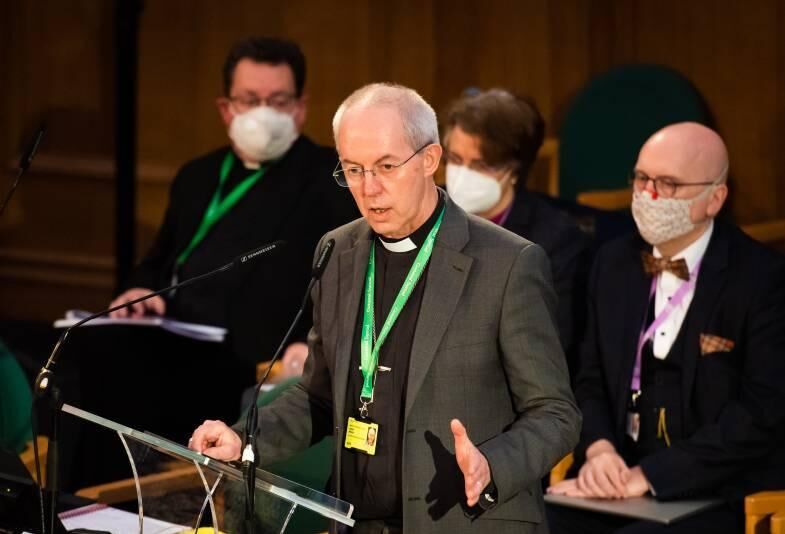Is the UK no longer a Christian country?

The headline was stark, the commentary withering: “Britain is no longer a Christian country, say frontline clergy.” Among other striking points, the Times’ exclusive survey of clergy of the Church of England found that:
53.4% of respondents answered that the C of E should allow clergy to conduct same-sex weddings, compared to 36.5% against
59% of respondents answered that they would offer blessings to same-sex couples, compared to 32.3% against
62.6% of respondents answered that the church should drop opposition to premarital sex, compared to 34.6% who said this should remain
62.9% of respondents answered that churches who opposed female bishops should lose the ability to have alternative oversight like they currently do for reasons of conscience
40.5% of respondents answered that they were overworked and 32.7% said they had considered quitting their role in the last five years
Only 24.2% said Britain could be called a Christian country today
Inevitably, liberal campaigners seized upon the results as “absolutely huge”, and linked the decline in church attendance and the state of Christianity in the nation with orthodox teaching around sex and marriage.
Professor Linda Woodhead, head of the theology and religious education department at Kings’ College, London, commented:
“This survey shows the clergy take a more moderate position than their leaders. [Frontline priests] are more in touch with their congregations and ordinary people. If they had been listened to more by leaders . . . the church might be in a better place today.”
But dig beneath the surface, and the situation (although still somewhat depressing) is not as hopeless as liberal activists, or indeed The Times, who have been subject to criticism in the aftermath of the results, would have you believe; if we actually think about what has been going on - and in particular, about what our role and God’s role are within that - then the picture looks less bleak.
Misleading methodology and skewed stats
Taken at face value, the percentages of C of E clergy adopting liberal positions are very concerning. But in the aftermath of the results, a number of commentators have pointed out flaws in their methodology.
The Times sent out 5000 invitations to clergy, and 1200 members responded. The problem with that was that it then became somewhat self-selective! There was no weighting back, after that, in comparison to the size of particular demographics (whether by age, sex, or theological camp) to see whether any particular group had been over-represented.
Ian Paul skewered their methodology very effectively in his blog this week:
“The one thing we can report with confidence, then, is ‘76% of C of E clergy have better things to do in August than complete a survey.’ And you don’t have to think too hard to work out some of the selective factors motivating you to complete this or ignore it. Suppose you are leading a large and growing church, and are taking a group from your church to one of the summer festivals. Are you going to fill out the form? Likely not…This really is the worst way to conduct an opinion poll or survey.”
The survey - even though the broad contours of their results probably have some truth in them - tells us little more than the views of people who want to respond to a survey about contentious issues, and those who are most likely to respond tend to be people who are active campaigners for change.
By contrast, commentators have also noted that anecdotally a number of clergy members were reluctant to answer the poll because they feared their answers would be used against them personally.
And of course, the survey was only of clergy of the Church of England; yes, the C of E is important, but if we are thinking about the state of Christianity in the UK (which The Times headline suggested, rather than the survey itself), it would be interesting to hear the views of Baptists, Presbyterians, non-conformists, Catholics et. al; we would, I suspect, get rather different results!
In short, there should be no surprise that such a survey has led to the results it has; it was never going to be very representative, and the results should be taken with a certain pinch of salt.
Clashing with culture
It has always been a source of confusion to me that liberal campaigners conflate a decline in church attendance with the church believing things that clash with modern culture, when the statistics are at this point well-established: it is the churches that retain their theological distinctives which are growing, not those who mirror culture.
Theo Hobson this week commented in The Spectator in the aftermath of the survey:
“For the first time in about 40 years it is possible to imagine a church that is united enough on gender and sexuality, and in tune with the wider culture. The era of division is ending, thank God.”
If I’d had a cup of tea, I’d have choked on it.
To imagine a church united around liberal views of gender and sexuality is utter madness. When, earlier in the year, the General Synod voted in favour of the Bishops’ move to offer prayers of blessing for same-sex couples (and others), the liberal motion only carried by 103-92 in the laity. The one amendment to the original motion the bishops put forward which passed was one in a conservative direction, commending the decision “not to propose any change to the doctrine of marriage”, and saying that the prayers “should not be contrary to or indicative of a departure”. This amendment itself passed by only a single vote in one of the houses.
As John Dunnett, the director of CEEC, said this week:
“My overarching response is that it signposts a thoroughly divided Church of England. The question it raises, the million-dollar question, is how is the [church] is going to face a situation in which the level of division is both so substantial and runs so deep?”
But even more remarkable was Hobson’s remarks about wanting a church “in tune with the wider culture.”
The church has never been called to be tune with culture; we do, of course, recognise that everyone - with all made in the “image of God” - has been given “common grace”. Everyone is capable of goodness. But the reason why the church can never adopt the agenda of culture is that humans are not all good. Being fallen as we are, the societies which we live in are broken and do not enable flourishing the way God intended us to.
As Christians, we believe we have access to the “mind of Christ”, and that through the Bible, which acts as a lens for interpreting the world around us, we are able to see things as they really are, because we can see them how God, the Creator who defines reality, sees them. We therefore critique the culture we are in, affirming what is good within it (for some things are good) and challenging what is not (for some things are not good).
The idea then, that we should worry about being in step with culture is truly bizarre, and out of keeping with historic Christian theology (not least because culture is also in a perpetual state of flux, and differs throughout the world, whereas God’s Word isn’t and doesn’t!).
Christian views have always been out of step with culture; indeed, for all that the Biblical writers are criticised today by liberals around sex and gender, Christian ethics were so revolutionary and life-giving within their original context because of how damaging the culture was. To say that the church should follow society actually leads to incredibly offensive views.
Within the ancient world Jesus and the Christian faith exploded into, wider culture’s views around sex and gender were abusive and misogynistic. Tom Holland has drawn this out at length in his book Dominion:
“As captured cities were to the swords of the legions, so the bodies of those used sexually were to the Roman man…To be penetrated, male or female, was to be branded as inferior…men no more hesitated to use slaves and prostitutes to relieve themselves of their sexual needs than they did to use the side of a road as a toilet.”
When people say the church should follow society, they only tend to mean liberal 21st century UK society; even though future generations will surely look back at us and find things to criticise, just as we do with our forbears.
It is only when the church looks to critique society, affirming what is good and challenging what is not, that it is doing its job right.
Our limited responsibility
While we are always to strive for the Kingdom, there is great reassurance in recognising what is, and what isn’t, our responsibility.
In Jesus’ glorious words to Peter about his future plans for the church, he says:
“And I tell you that you are Peter, and on this rock I will build my church, and the gates of Hades will not overcome it.“
It is - ultimately - God who builds his church, and not us.
This is both humbling and wonderfully liberating. It takes us back down to size whenever we are tempted to be puffed up with our own success or to do things without approaching God in prayerful dependence: apart from Him we can do nothing. But it is also freeing, knowing that He is the one who is ultimately responsible for the results, not us. It is Him to whom we will give account one day, not ourselves.
Or as the Psalmist once put it:
“Unless the Lord builds the house, those who build it labor in vain.”
We are to look to God and to his purposes and future plans. And - although we will have to see what happens at the Synod in November - it is just possible that those don’t involve the Church of England. For Jesus ultimately said that he would build his church, not his C of E.
Within the Old Testament in particular, we read how God did not always just bless the established worshipping community whose sacrifices he came to despise, but was far more interested in the faithful remnant.
And this, ultimately is our call: to be faithful, even if the Church of England is not, trusting that one day we will be vindicated. For regardless of how culture may twist and turn in this span of human history, one day, God will bring this age to a close, and we do know where history is going, as Jesus will return and put right everything which has gone wrong.
In the second Narnia book to be written, CS Lewis tells the story of how much of the land of Narnia has forgotten the story of Aslan’s defeat of the White Witch, the Pevensie children, and even Aslan’s very existence; Prince Caspian’s old nurse used to tell him stories about them, until she was dismissed by the wicked King Miraz. Towards the end of the book, Aslan returns, and begins to put everything right again. He visits the house of the nurse, by this point old and frail, and seemingly on her deathbed.
“She was at death’s door, but when she opened her eyes, and saw the bright, hairy head of the lion staring into her face, she did not scream or faint. She said, 'Oh Aslan! I knew it was true. I’ve been waiting for this all my life.'”
One day, Jesus will come back and make all things right, and on that day, we pray that he will say to us: “Well done, good and faithful servant.”






